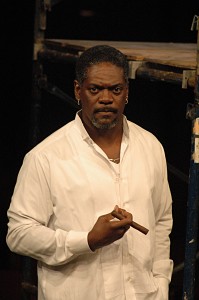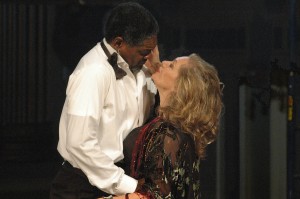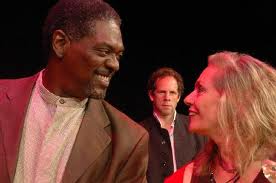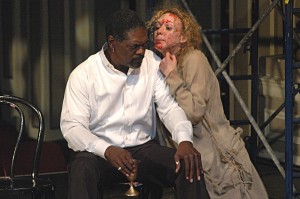Strand Theatre, Dorchester, Mass.
October 19 – November 17, 2006
Critical Response
“But Claudius—oh, Claudius! ‘Guest artist’ Johnny Lee Davenport exudes such fire as the usurper that the play might as well be called Claudius. His magnificent voice finds all the music in the text and sends it caroming into the nether reaches of the spookily underpopulated theatre. He’s one of those performers who keep you on edge, with intimations of imminent volatility.”
—Sandy MacDonald, EDGE Boston (October 21, 2006)
“Johnny Lee Davenport’s performance of Claudius was, I think, the highlight of the play. He portrayed a villain with sympathetic qualities, and a believable internal life, who is nonetheless sufficiently vile that you feel he has to die. While I’ve always seen Claudius as killing the king to take over the kingdom, and marrying Gertrude as part of his bid to consolidate power, his Claudius committed his crimes as much to gain the queen as the country. And the deep and passionate love he feels for Gertrude is reciprocated.”
—Xiphias Gladius, Live Journal (October 23, 2006)
“And speaking of Claudius and Gertrude: Johnny Lee Davenport and Marya Lowry are the most charismatic royal couple since Kyle MacLachlan and Diane Venora in the underrated 2000 Michael Almereyda/Ethan Hawke film.”
—Ed Siegel, Boston Phoenix (October 24, 2006)
“Davenport’s Claudius is a suave snake, a man who seems less concerned about power than the pleasure he takes in his queen, Gertrude. His Claudius seems genuinely annoyed with his stepson’s misbehavior, and who can blame him for wanting to reprimand this wayward Hamlet? But when Claudius gives his reasoning for his deeds, Davenport is formidable, and when his conscience is finally caught he seems to fall apart before our eyes.”
—Terry Byrne, Boston Herald (October 24, 2006)
“The usually eclectic ASP cast is bolstered by Johnny Lee Davenport, who’s appeared with S&C and many other Shakespeare companies, as Claudius.”
—Will Stackman, The Theater Mirror (October 24, 1006)
“Johnny Lee Davenport’s Claudius gives a sense of the variety and richness in tone. . . . He thunders, but he also whispers, and the contrast makes his bellowing seem all the more ferocious. In his strongest moment, when Claudius bemoans his inability to pray, Davenport achieves a majestic theatricality . . . without distracting us from the words themselves.”
—Louise Kennedy, Boston Globe (October 26, 2006)
“Johnny Lee Davenport and Marya Lowry are the sybaritic King and Queen crazy in love leaving state affairs to a not so buffoonish Polonius (Robert Walsh).”
—Chris Harding, Dorchester Reporter (October 26, 2006)
“The most notable guest star has been Johnny Lee Davenport as Claudius. . . . His Claudius is quite the charmer, more in love with power than policy. When it comes to the actual work of running the kingdom, he seems more than willing to delegate that to Polonius’ decisions. He’s also very much in love with Gertrude. The NRE between them is quite palpable the first half of the play, and they’re an extremely passionate and demonstrative couple.”
—Lis Riba, Rambles Reviews (October 27, 2006)
“Claudius and Gertrude here are a bi-racial couple—Blonde Marya Lowry and Black Johnny Lee Davenport—a royal couple eagerly and publically and physically in love with each other.
At the opening of the play, Davenport’s Claudius is almost drunk with power. He swaggers through dismissal of a threat that Fortinbras of Norway will invade, and swirls his giddy bride into luscious embrace before the entire court. In total arrogance, cocking his fingers in a high-elbowed, smiling gesture, he offers (subtext: demands) subordinants his ring to kiss. (Hamlet, in contemptuous exaggeration, falls equally arrogantly to his knees to give his kiss.) As his stepson gnaws away at his office, Claudius gradually reveals himself as an unsteady, crafty monarch, cooly negotiating with Laertes (even while the populace outside the palace are howling ‘Laertes shall be king!’) to murder the obstreperous Hamlet three subtly treacherous different ways. In a soliloquy halfway through the action, Davenport momentarily makes the play ‘The Tragedy of Claudius, King of Denmark.'”
—Larry Stark, The Theater Mirror (October 2006)
“Claudius’s tortured innerness [emerges] in an arresting prayer scene, daringly performed as an inquisitorial probing on the nature of prayer that lashes the audience as much as it does himself. Here Davenport’s magisterial presence is incontestable.”
—Laury Magnus, “Hamlet in Boston: Conversations and Production” in the Shakespeare Newsletter (Fall 2006)




